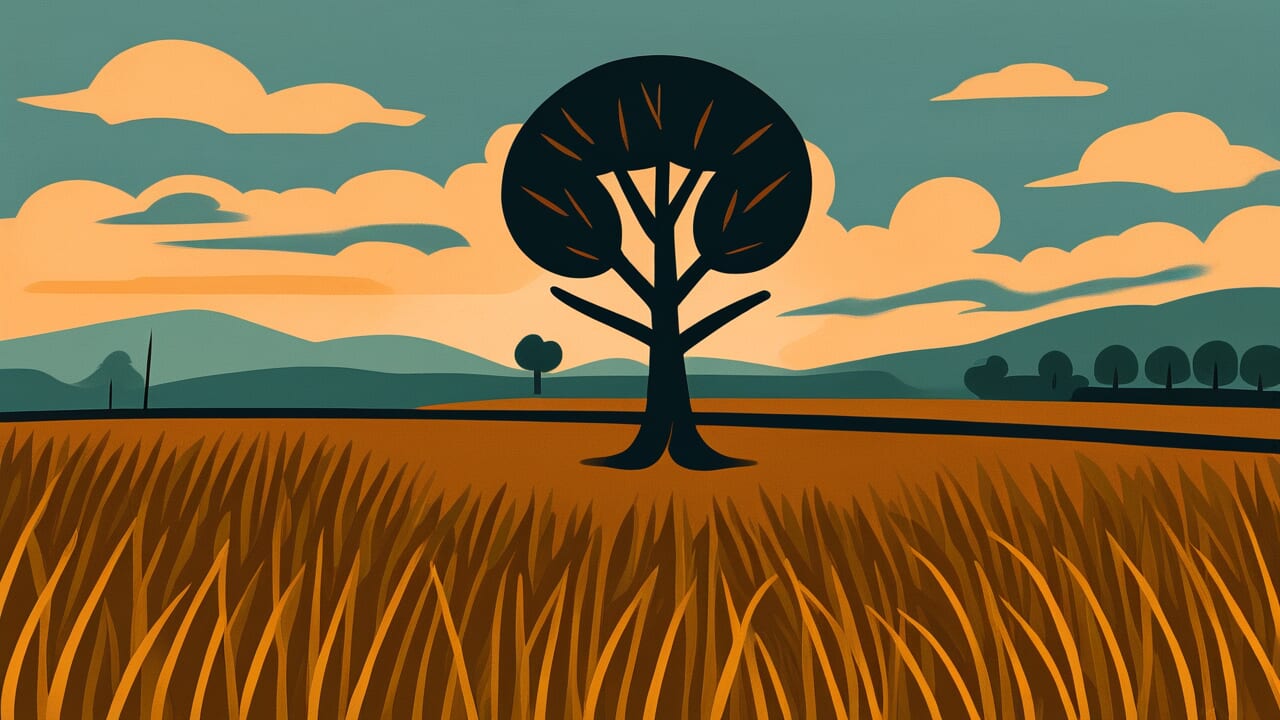How to Read “Under a large tree, no beautiful grass grows”
Taiju no moto ni bisō nashi
Meaning of “Under a large tree, no beautiful grass grows”
“Under a large tree, no beautiful grass grows” means that people struggle to show their talents when working under someone exceptional.
Just as grass cannot grow beneath a large tree that blocks sunlight, people find it hard to develop their abilities when overshadowed by someone with outstanding skills.
The presence and influence of such exceptional people become so overwhelming that others cannot fully stretch their talents.
This proverb points out problems that arise when leaders are too excellent. Under charismatic bosses or mentors, subordinates and juniors have fewer chances to think and act independently.
They lose opportunities to grow. Also, talented people may go unnoticed and unappreciated when hidden in the shadow of someone more prominent.
Today, people often use this proverb when discussing human resource development and organizational management. It explains the disadvantages of having an overly strong leader at the top.
Origin and Etymology
The exact source of this proverb remains unclear, but scholars believe it was influenced by ancient Chinese philosophy.
The expression comes from observing nature: beautiful grass cannot grow under large trees because they block sunlight.
You can easily confirm this phenomenon by walking through a forest. The ground beneath giant trees stays shaded.
Sunlight needed for photosynthesis cannot reach the ground. Grass and flowers that need light cannot grow properly, leaving the ground relatively bare.
This proverb applies this natural principle to human society.
In ancient China, people often used trees as symbols for powerful rulers or excellent individuals.
The word “large tree” itself was used metaphorically to represent authority and ability, not just a big tree. Meanwhile, “beautiful grass” represents talented people.
After reaching Japan, this idea of overlapping natural laws with human relationships continued as an important perspective for understanding organizations and mentor-student relationships.
This proverb contains the insight of our ancestors who understood the essence of human society through observing nature.
Usage Examples
- That department is in a state of “under a large tree, no beautiful grass grows” because the manager is too excellent, so young employees cannot develop
- Learning under him is good, but as they say “under a large tree, no beautiful grass grows,” you should eventually become independent and walk your own path
Universal Wisdom
The proverb “under a large tree, no beautiful grass grows” offers deep insight into the relationship between growth and dependence in human society.
Why do people fail to demonstrate their own abilities when near someone excellent?
It happens because humans naturally tend to choose the easier path. With a powerful protector, you can avoid the painful process of thinking for yourself, taking risks, and learning from failures.
The shade of a large tree feels comfortable and safe. But this very comfort becomes a trap that prevents growth.
Also, the presence of excellent people creates a psychological barrier in those around them. People lose confidence through comparison and their motivation to challenge themselves withers.
This is not a problem of ability but of psychological environment.
This proverb has been passed down through generations because humans always face this dilemma when living in groups.
Excellent leaders bring stability to organizations, but they also risk hindering the growth of the next generation.
Our ancestors overlapped this contradictory truth with natural laws, continuing to warn us. Growth requires adequate sunlight, which sometimes means leaving the large tree.
This is a strict yet kind teaching.
When AI Hears This
Grass fails to grow under large trees not just because of shade. According to ecological research, a tree 30 meters tall spreads its roots across an underground area of about 90 meters.
That is three times its height. In other words, it absorbs water and nutrients from an underground space nine times larger than the visible shadow above ground.
More interesting is the “three-dimensional structure” through which large trees monopolize resources. Above ground, the canopy blocks over 95 percent of light.
On the surface, fallen leaves change the soil’s pH. Underground, fine roots preferentially absorb nitrogen and phosphorus from the soil.
This complete encirclement from above, below, left, and right leaves almost no room for other plants to survive.
Yet in nature, some plants survive even in this harsh environment. These are species that take completely different strategies from large trees.
For example, plants that bloom only in early spring and finish growing before the large tree spreads its leaves. Or plants that use only special nutrients the large tree does not utilize.
Ecologists call this “niche differentiation.”
This phenomenon occurs in human society too. Small companies struggle around large corporations not just because of name recognition differences.
Large corporations monopolize multilayered resources: funding, talent, information, and business partners. To survive, you must find a different niche—different time slots or customer segments from the large corporation.
Lessons for Today
This proverb teaches us two important things.
First, if you are learning under someone, recognize the danger of staying under their protection forever. Working under an excellent mentor or boss feels comfortable and offers much to learn.
But if you settle there, you cannot shine your own light. You need courage to become independent at the right time and stand on your own feet.
Experience in thinking, deciding, and taking responsibility for yourself without fearing failure is what makes you grow.
Second, if you are in a position to guide others, always consider whether your excellence is hindering the growth of those around you.
Instead of solving everything yourself, sometimes step back and give others opportunities to challenge themselves.
This may seem to sacrifice efficiency, but in the long term it strengthens the entire organization.
In modern society, a team where everyone can demonstrate their abilities is stronger than a single genius.
This proverb reminds us of a simple but easily forgotten truth: growth requires adequate space and light.



Comments